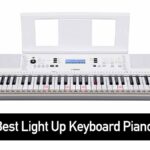Diving into the world of music can be as exhilarating as it is daunting, especially for those just starting their journey with the keyboard. Finding the right guide to lead the way is crucial. That's where the magic of a good lesson book comes in. It's not just about learning the notes but also about sparking that initial love for music.
With a plethora of options available, choosing the best keyboard lesson book for beginners might seem like looking for a needle in a haystack. But fear not! The perfect book doesn't just teach; it inspires, making every practice session something to look forward to. Whether it's mastering the basics or exploring the first melodies, the right book can make all the difference.
Benefits of Using Keyboard Lesson Books
When embarking on the journey of learning the keyboard, beginners might wonder about the most effective approach to develop their musical skills. Keyboard lesson books stand out as invaluable resources for several reasons, offering a structured pathway to musical proficiency.
Firstly, these books are designed to gradually introduce learners to the fundamentals of keyboard playing, ensuring that they build a solid foundation in both theory and practice. From understanding musical notes and rhythms to mastering hand positioning, lesson books break down complex concepts into digestible, manageable lessons. This not only helps in avoiding overwhelming beginners but also fosters a sense of accomplishment as they progress through each chapter.
Moreover, keyboard lesson books often include a variety of music genres, catering to different tastes and interests. This diversity is crucial in keeping students engaged and motivated. Whether they're drawn to classical, jazz, or pop music, learners can find pieces that not only challenge them but also excite their musical curiosity. As they explore various styles, students naturally develop a more versatile skill set, which is beneficial for their overall growth as musicians.
Another significant advantage is the inclusion of practice exercises in these books. Structured exercises enable learners to apply newly acquired knowledge, reinforcing their learning. Many books also come with performance pieces, which prepare students for recitals or informal performances. This practical aspect of lesson books encourages regular practice and helps beginners understand the application of theoretical knowledge to actual music playing.
For those who appreciate feedback and structure, some keyboard lesson books offer access to online resources. These can include video tutorials, additional exercises, and even interactive apps that allow learners to track their progress. Such resources are immensely helpful in providing visual and auditory references, which can enhance understanding and make the learning process more engaging.
| Benefit | Description |
|---|---|
| Solid Foundation | Gradually introduces fundamentals, ensuring a thorough understanding of keyboard playing. |
| Variety of Genres | Offers pieces from different music genres to keep lessons engaging and cater to all interests. |
| Structured Practice Exercises | Includes practice exercises and performance pieces for applying knowledge and improving skills. |
| Access to Online Resources | Provides additional learning materials and interactive tools for enhanced learning experience. |
By integrating keyboard lesson books into their practice routine, beginners not only learn how to play but also develop a deep appreciation for music. This approach makes the journey from novice to accomplished musician both enjoyable and fulfilling.
Factors to Consider When Choosing a Keyboard Lesson Book

When delving into the world of keyboard mastery, picking the right lesson book is pivotal. This guide can serve as a beacon, leading the way through musical notation and complex chords. However, not every book is suited for every beginner. There are several factors to weigh when making this choice, ensuring the journey into music is both enjoyable and efficient.
Learning Style and Content: One size doesn't fit all, especially in music education. Beginners should look for books that align with their learning preferences. Some learners thrive on visual aids and diagrams, while others may prefer detailed written instructions or a mix of both. The content should introduce musical concepts progressively, ensuring a solid foundation is built before moving on to more complex lessons.
Genre and Musical Interests: Engagement is key to persistence and enjoyment. Beginners should consider their musical tastes when selecting a lesson book. Whether it's classical, jazz, pop, or rock, a book that includes genres of interest can enhance motivation. Some books offer a broad spectrum of genres, which is perfect for those still exploring their musical preferences.
Practice Exercises and Performance Pieces: Practice makes perfect, and the right book should provide ample exercises that reinforce the lessons learned. These exercises should vary in difficulty, gradually preparing the student for more challenging pieces. Additionally, including performance pieces allows beginners to apply what they've learned in a more cohesive and enjoyable manner.
Online Resources and Audio Tracks: Many modern keyboard lesson books come with online resources, such as video tutorials, downloadable sheets, and audio tracks. These supplementary materials can greatly enhance the learning experience, offering visual and auditory aids that books alone cannot provide. Beginners should look for books with these features, as they can make practice sessions more engaging and effective.
Reviews and Recommendations: Lastly, one should not overlook the wealth of information available through reviews and recommendations. Hearing about the experiences of others can provide valuable insights into the book's effectiveness and suitability for beginners. It's a good practice to research and read reviews from various sources before making a final decision.
In considering these factors, beginners will be better equipped to choose a keyboard lesson book that not only meets their immediate needs but also sets the foundation for continued musical growth and exploration.
Top Picks for Best Keyboard Lesson Books for Beginners

After understanding the factors to consider when choosing a keyboard lesson book for beginners, it's time to dive into some top picks that have stood out in the musical community. These selections are based on their ability to cater to different learning styles, inclusion of a wide variety of genres, and their overall effectiveness in building foundational skills for beginning keyboardists.
Alfred's Basic Adult All-in-One Course
One of the most recommended books for beginners is Alfred's Basic Adult All-in-One Course. It's a comprehensive guide that covers theory, technique, and reading in a single volume. What makes it especially appealing is its use of familiar tunes and engaging exercises that keep learners motivated. Notably, this book also includes access to online audio tracks, allowing students to hear what the music is supposed to sound like, which aids in their understanding of rhythms and melodies.
Hal Leonard Student Keyboard Guide
Another excellent resource is the Hal Leonard Student Keyboard Guide. Hal Leonard is a renowned name in music education, and this book lives up to the brand's reputation. It's structured in a way that makes learning fun and interactive for beginners of all ages. The book includes a variety of musical genres to play, from classical to contemporary, ensuring that students remain engaged and excited about learning. The layout is clear and easy to follow, with colorful illustrations that enhance the learning experience.
John Thompson's Easiest Piano Course
For those who prefer a more classical approach, John Thompson's Easiest Piano Course is a fantastic selection. The book is well-regarded for its systematic approach to teaching piano basics, such as notes, rhythms, and chords. Each lesson is short and simple, which prevents beginners from feeling overwhelmed. As students progress, they're introduced to more challenging pieces that build on previous lessons, ensuring steady progression.
Piano Adventures by Nancy and Randall Faber
Piano Adventures by Nancy and Randall Faber offers a multi-dimensional learning experience that caters to both children and adults. What sets this series apart is its focus on developing musicality from the very beginning. The books include engaging, original music that encourages expressive playing. Additionally, Piano Adventures provides online support, including tutorials and play-along tracks that make practice sessions more effective and enjoyable.
Tips for Getting the Most Out of Your Lesson Book

Selecting the right keyboard lesson book is just the first step on a musical journey. To truly maximize the benefit of these resources, aspiring pianists should adopt a series of best practices. These tips will ensure that learners not only progress through the lessons but also enjoy the process and retain what they've learned.
Set Realistic Goals is vital for keeping motivation high and tracking progress. Beginners should define short-term objectives for each practice session, such as mastering a particular scale or playing a song without mistakes. Equally important are long-term goals which could range from completing the book to performing a piece in front of an audience. By setting these benchmarks, learners can focus their efforts and celebrate their achievements along the way.
Practicing Regularly cannot be overstated. Consistency is key when learning an instrument. Even short, daily practice sessions are more effective than sporadic, lengthy ones. This habit helps in building muscle memory and improving sight-reading skills. Beginners should aim for at least 15-30 minutes of practice a day, gradually increasing the duration as they become more comfortable with the keyboard.
Another crucial aspect is Engaging with the Material. Most modern lesson books come with additional resources like online audio tracks or apps. These tools are not just supplementary; they're integral to the learning experience. Listening to recordings helps with understanding the rhythm and dynamics of a piece, while apps can offer interactive lessons that adapt to the user's pace. Beginners should take full advantage of these features to enrich their learning.
Seeking Feedback and Guidance is especially important for self-learners. Feedback can come from various sources: teachers, online communities, or even friends and family. Constructive criticism can highlight areas for improvement and motivate learners to push their boundaries. Additionally, online forums and social media groups offer a wealth of tips and encouragement from fellow beginners and experienced pianists alike.
Lastly, it's imperative to Focus on the Journey. Learning to play the keyboard is as much about the process as it is about the outcome. Instead of racing through the book, learners should take the time to enjoy each lesson and celebrate the progress, no matter how small. Understanding that mistakes are part of learning and patience is essential can transform the experience from a challenging task to a rewarding hobby.
Conclusion
Choosing the right keyboard lesson book is just the beginning of an exciting musical journey. By setting achievable goals and dedicating time to regular practice, beginners can make significant strides in their playing. It's crucial to complement book learning with online resources and apps that add variety and depth to the practice sessions. Remember, seeking feedback and embracing the learning process with a positive mindset are key to not only improving but also finding joy in every note played. With the right approach and resources, anyone can master the keyboard and enjoy making music.
Harlan Kilstein began playing piano during covid with no piano background at all. He taught himself how to play learning what to do and what not to do.
Today he's an advanced intermediate player and can help you grow in your skills because he learned all this on his own.








